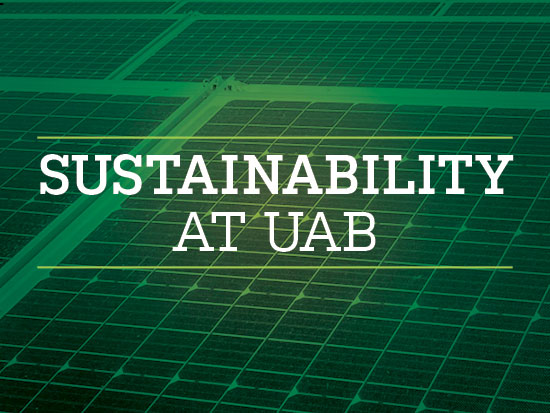Written by: Haley Herfurth
Media contact: Alicia Rohan
 By 2025, the University of Alabama at Birmingham hopes to transform its academic and medical entities through education, operations and research and promote global thinking and local action with the launch of its sustainability strategic plan.
By 2025, the University of Alabama at Birmingham hopes to transform its academic and medical entities through education, operations and research and promote global thinking and local action with the launch of its sustainability strategic plan.
“UAB already is on a great track and a leader in sustainability in Birmingham,” said UAB Sustainability Manager Julie Price. “We want to build on the success we’ve achieved during the past several years and use it to jumpstart a new era on campus.”
The UAB campus is no stranger to sustainable action: The Red Mountain Project enables faculty to integrate sustainability education into their curriculum, and there are more than 20 electric car-charging sites available for public, student and employee use. There are also a pollinator garden, a thriving Green Labs program saving UAB hundreds of thousands per year in lab energy costs and an award-winning parking lot built for water pollution reduction.
The UAB Sustainability program formed more than a dozen working groups comprising 65-plus members and held public listening sessions on campus and in UAB Hospital, made presentations to shared-governance groups such as the Faculty Senate, Staff Council and Undergraduate Student Government Association, and distributed an online survey to all campus and hospital employees and students.
The result, Price says, is this new strategic plan, which extends from campus and community engagement to grounds and waste management and describes ways in which the decisions made during the next six years will help make UAB an even more sustainable institution, consistent with the shared value of stewardship.
A strong start in 2019
While the strategic plan provides a roadmap for campus sustainability strategies through 2025, many of the program’s biggest initiatives will happen before the end of 2019, including:
- UAB will open its first LEED-certified building — the College of Arts and Sciences Building, which will save energy, water and resources and generate less waste.
- Fifty trees will be planted for UAB’s 50th anniversary, in keeping with the university’s designation as a Tree Campus USA by the National Arbor Day Foundation.
- The Green Labs program will induct its 200th member, meaning the savings to UAB could scale to $720,000 in the program’s third year.
A leader in Birmingham’s sustainability
UAB wants to expand its sustainability footprint beyond our campus and engage the Birmingham community through education, partnerships and demonstrations. These efforts will include:
- Formalizing partnerships with Birmingham-area government municipalities to help educate and collaborate with communities to become more sustainable.
- In the next five years, UAB wants to reduce employee-alone commuting from 88 percent to 83 percent and student-alone commuting from 82 percent to 75 percent. This will in turn help decrease vehicle traffic on campus and in the Birmingham area, as well as reduce carbon emissions.
- A comprehensive solid waste management plan will allow for partnerships with external stakeholders to reduce disposal of waste in local landfills. An evaluation of UAB’s total waste amounts generated on campus and in the hospital will be the first step toward this goal. Creating a student-run recycling center will create jobs with specific learning outcomes.
- Supporting local businesses through partnerships with local restaurants and expanding on our food truck permit program will help UAB’s sustainability support the environment by minimizing food waste and supporting local and sustainable food production. Key initiatives include the development of an app that will alert users of leftover food pickup from events, setting guidelines for use of green catering services, and reducing energy use and emissions of food trucks.
“If UAB wants to become more sustainable, we have to come together as a community to learn about the ways each individual can contribute to our overall footprint,” Price said. “We are looking to educate and learn from those at UAB, the Birmingham community and beyond regarding the impact they can have by making small changes in their daily lifestyles.”
A future built on clean energy
UAB is committing to larger, more extensive sustainability changes during the next six years, Price says, including a promise to generate 20 percent of its electrical energy from renewable resources and reduce its greenhouse gas emissions by 20 percent by 2025.
“Sourcing renewable power and reducing emissions are good for local air quality, economic development, human and ecosystem health, and combating climate change,” Price said. “UAB is one of the largest electricity users in the state, and this goal is reflective of energy purchasing among large users, both public and private, around the world.”
Other initiatives will include instituting better recycling and composting programs and leveraging the university’s $7 billion economic impact to encourage suppliers to use local and sustainable products and processes through contracts and specifications.
“When a large, influential entity like UAB makes sustainability a priority, that can make waves, not just at the local and state level, but at the national or global level, too,” Price said. “We’re glad that making UAB a greener place to learn, work and live is an institutional priority.”